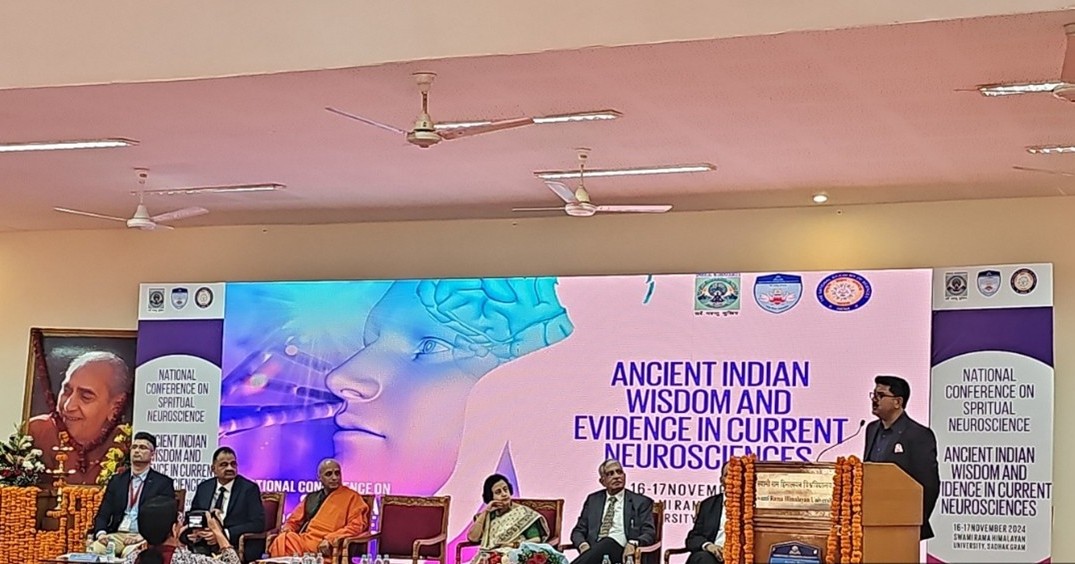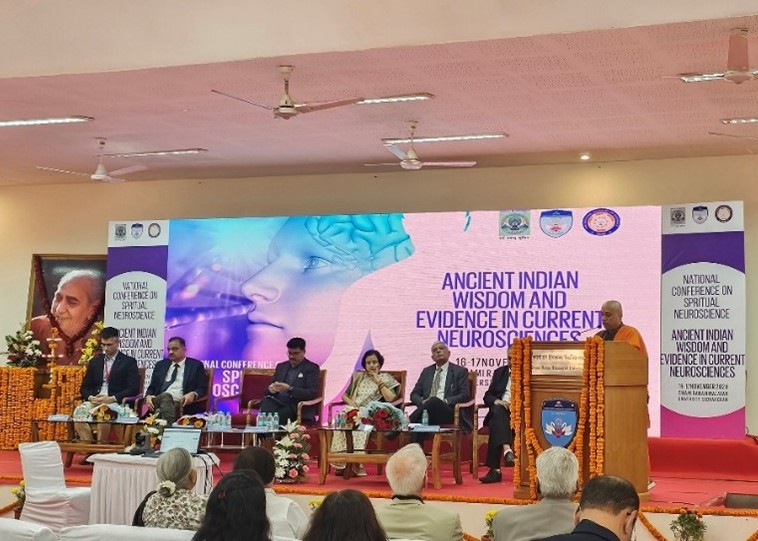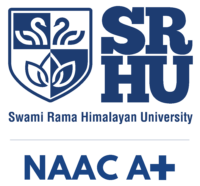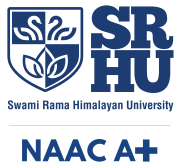Published on: November 16, 2024
The Department of Neurology and the Neuroscience Centre at Swami Rama Himalayan University (SRHU), Dehradun, organized the first-ever National Conference on “Spiritual Neurosciences” on 16-17 November 2024. The event aimed to advance evolutionary and holistic healthcare inspired by H.H. Swami Rama, the founder of SRHU. Swami Rama’s unique approach combined Western scientific methodologies with traditional Eastern wisdom. The conference focused on merging advanced neurological science with ancient spiritual practices to promote comprehensive physical and mental health.
The conference featured distinguished neuroscientists from India and abroad presenting on topics such as EEG correlates of meditation, Yoga Nidra, cognitive reserve, and meditation. It represented a novel effort to integrate modern neuroscience with ancient Indian knowledge, aiming to develop a holistic framework for preventing and managing neurological disorders. The overall goal was to promote a humanitarian approach to healthcare emphasizing both mind and body wellness.
The first session on Spiritual Practices and Current Neurosciences included a talk by Dr. Rajesh Manik from Kalinga University on the neural anatomy and physiology of human chakras. He explored how ancient energy centers correspond with nerve plexuses and physiological processes, opening new paths for integrative research. Dr. Shobit Garg from SGRR University discussed the neurobiology of stress and the PNIE axis, highlighting how chronic stress impacts immune health and how meditation and yoga can enhance resilience by regulating stress responses.
Dr. Swami Dayadhipananda from Ramakrishna Mission Hospital Mumbai spoke on the levels of consciousness from both spiritual and neuroscientific perspectives, aligning traditional concepts of Sat, Chit, and Anandam with conscious, subconscious, and unconscious states. He advocated integrated approaches combining yoga with modern treatment to elevate well-being. Dr. John Clark from the USA presented on QEEG’s role in spiritual practices, explaining how brain imaging techniques reveal meditation’s effects on brainwave patterns and heart rate variability, with implications for biofeedback therapy.
In the first plenary lecture, Prof. B.N. Gangadhar, Chairperson of the National Medical Commission, emphasized spirituality and integrative healthcare in mental health. He highlighted Ayurveda’s holistic health model and growing evidence supporting yoga and spirituality’s mental health benefits. He called for integrative healthcare models blending traditional practices and complementary medicine to empower patients.
Dr. Prakash Keshaviah of SRHU shared insights from Swami Rama’s research on voluntary control over autonomic nervous system functions. He described Swami Rama’s ability to control physiological processes, such as heart rate and brainwave generation, illustrating the deep connection between spiritual practices and physiological regulation. Dr. Keshaviah also introduced the body-breath-mind-soul model that underpins this integrative approach.
Session three focused on neural networks and evaluation techniques for spiritual practices. Dr. Ashwani Bhat from SRHU presented his research on neural mechanisms of meditation, highlighting how meditation modulates key brain networks related to attention and cognitive control. Dr. Ravindra P.N. from NIMHANS discussed the effects of ageing on sleep and how meditation improves sleep quality by regulating neurophysiological pathways, enhancing awareness of sleep consciousness.
Dr. Binny Sareen, Peace Ambassador from Mount Abu, described how meditation strengthens cognitive reserve and neuroplasticity, supporting brain health and resilience. Dr. Naveen K.V. from the University of Sydney elaborated on integrative medicine’s role in modern practice, advocating for India’s leadership in combining traditional knowledge with evidence-based healthcare models.
The second day was held at Sadhaka Gram Ashram in Rishikesh, beginning with a guided meditation session led by Swami Ritavan Bharati Ji that fostered mindfulness and spiritual awakening among participants. The day’s scientific session on occult sciences featured an expert panel discussing Yoga Nidra, hypnosis, plant-based diets, and medical astrology.
Professor Manjari Tripathi from AIIMS presented on Yoga Nidra’s integration with cognitive behavioral therapy, emphasizing its benefits for restorative sleep and neurological conditions. Professor R.M. Kaushik from SRHU discussed hypnosis as an altered consciousness state with therapeutic applications in stress management and allergy treatment, including a live relaxation demonstration.
Professor P. Sarat Chandra from AIIMS highlighted the health benefits of plant-based diets, focusing on their positive impact on the gut microbiome, cancer risk reduction, and inflammation control. Dr. Prasanna Despande explored medical astrology’s relevance to health, explaining how zodiac signs correspond to organ systems and how planetary alignments could complement modern healthcare by providing holistic insights into individual health.
Dr. Deepak Goel announced the forthcoming establishment of a Society on Spiritual Neurosciences to facilitate research publication and collaboration among neuroscientists. The conference concluded with a felicitation ceremony honoring the expert panel and keynote speakers for their valuable contributions.
The National Conference on Spiritual Neurosciences successfully explored the intersection of brain function and spirituality, demonstrating how spiritual practices influence mental health, cognition, and well-being. It fostered interdisciplinary dialogue between neuroscience, psychology, and spiritual traditions to promote a holistic understanding and innovative therapeutic approaches.




